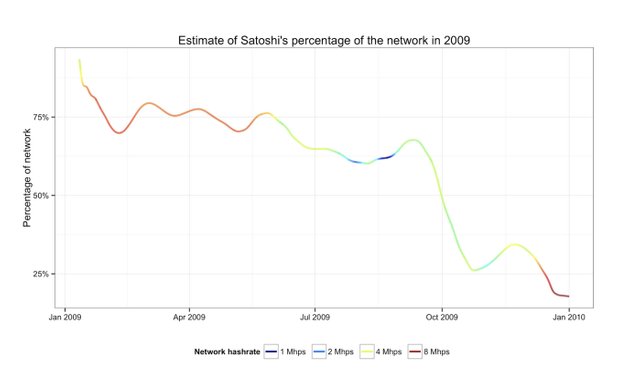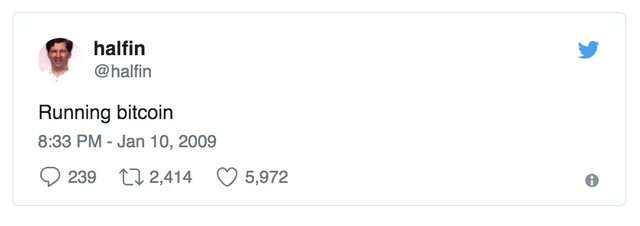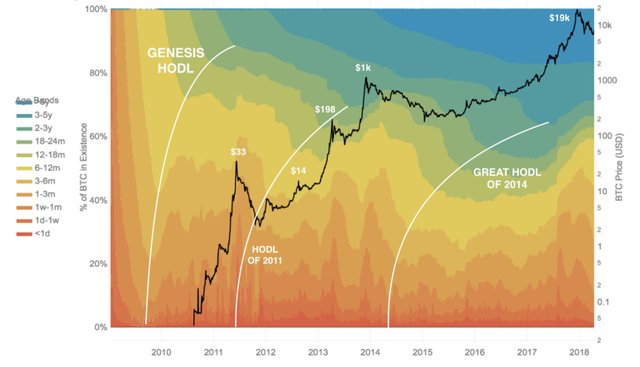Bitcoin - Thread Pick 👌🏻
An awesome, very nice tweet thread to read by @danheld
I seriously wanted to repost it here! Sorry @cheetah :P
All the @ usernames belong to twitter users.
1/ Many people think Bitcoin’s distribution wasn’t fair, or that Satoshi “stealth mined.” Below I dive into early mining, inequality, distribution, and ethics.
For a deeper dive, my Medium post: https://t.co/fWOT8UQ9Xl

2/ Satoshi didn’t premine. Satoshi gave everyone a 2 month heads up before mining the Genesis block, reaching out to the only other people who would possibly be interested in experimenting with a sovereign digital currency at the time, the cypherpunks. @MartyBent
3/ The whitepaper was published on October 31, 2008, then Bitcoin 0.1 software was released on January 9, 2009. The genesis block (the only block specially minted earlier) has a timestamp of 18:15:05 GMT on January 3, 2009.
4/ Satoshi included a message in the Genesis Block as a “proof of no premine.”
“The Times 03/Jan/2009 Chancellor on brink of second bailout for banks”
Before Satoshi’s invention, the concept of pre-mining didn’t exist. To be this prescient demonstrated incredible maturity.
5/ Anybody else could have mined by downloading the software (had a 1-click miner). The code to mine bitcoin was available on the day Satoshi began mining. Satoshi definitely wasn’t mining alone - we know for a fact that Hal Finney was mining one day after the initial launch. https://t.co/PBgIFzCb5c

6/ Satoshi mined because the network required a miner, he turned them off when there was a stable network that didn’t need his mining power. He reduced his % of the hashrate in a slow and steady manner. This implied Satoshi had a hashrate plan. https://t.co/WFS6Y0Tx8o
7/ How much did Satoshi mine? Other than 50 coins, it’s not empirically knowable how many he owned, but we can assign a high probability that he was the miner who minted close to ~700,000. https://t.co/u4i00gAJMa

8/ BitMEX reviewed the original estimate made by Sergio Demian Lerner where he discovered that Satoshi’s miner “fingerprint,” and concluded that there is reasonable evidence that a single dominant miner in 2009 could have generated around 700,000 bitcoin @BitMEXResearch @SDLerner
9/ Bitcoin’s market cap was ~$0 for nearly a year and a half. Miners were wasting money on hardware and electricity to mine, with no guarantee that the Bitcoins they received would ever have value.
10/ “Faucets” were set up to freely distribute Bitcoins in order to “seed” adoption. The first recorded exchange of Bitcoin for “real world” value occurred on May 22, 2010, where Laszlo Hanyecz agreed to pay 10,000 Bitcoins for two delivered Papa John’s pizzas. @gavinandresen
11/ “It might make sense just to get some in case it catches on. If enough people think the same way, that becomes a self fulfilling prophecy.” — Satoshi Nakamoto
12/ The early pioneers were the ones crazy enough to take the financial, temporal and social risks to participate in the Bitcoin project, keeping it alive and acting as arbiters of the system in its early days. Nearly all lost or sold all of their Bitcoins
13/ With each of those boom/bust cycles we’ve seen Bitcoin redistributed from old hodlers to new hodlers via selling, decreasing the Gini Coefficient. In 2017 alone, we saw 15% of all BTC move out of old hodler hands https://t.co/guC8PIYZuY

14/ The theoretical total number of bitcoins, slightly less than 21M, should not be confused with the total spendable supply. The total spendable supply is always lower than the total supply, and is subject to accidental loss, willful destruction, and technical peculiarities
15/ "Ten years ago cryptographers and HCI experts created the ultimate experiment to see how well human beings could hold onto long-lived secret keys...the results of that experiment have not been pretty." - Some Cryptographer on Twitter
16/ There are many stories of people losing BTC in large amounts — especially in the early days — when BTC wasn’t worth much and was easily forgotten on an old hard-drive, USB memory stick, even a scrap of paper.
17/ Coins which remain unspent for >5 years have a high likelihood to be lost forever. Despite the richness of blockchain data, it’s extremely difficult to measure how much cryptocurrency is truly lost, as lost coins leave no trace in the blockchain.
18/ “The study of lost bitcoin is geology masquerading as data science.” — @dhruvbansal
Unchained Capital did a great analysis of lost coins and estimate: 2.78–3.79M BTC lost which aligns with another more sophisticated analysis done by Chainalysis @jony_levin
19/ “Lost coins only make everyone else’s coins worth slightly more. Think of it as a donation to everyone.” — Satoshi Nakamoto
20/ From private key management mistakes, to scams and exchange hacks, to resisting selling temptation, early HODLers SURVIVED. In compensation for that risk, they absolutely deserve the value appreciation.
21/ Some argue Bitcoin’s distribution is analogous to a Ponzi scheme, but it’s nothing like one: it was transparent, offered no return, and has immense utility.
22/ “Bitcoins have no dividend or potential future dividend, therefore not like a stock. More like a collectible or commodity.” — Satoshi Nakamoto
23/ Satoshi was a person like any other, not some infallible being. This was the fairest distribution he could have come up with. It’s intellectually dishonest to compare Satoshi’s early mining of Bitcoin at a loss, with premining of an ICO with a positive market value.
24/ "Bitcoin benefited from a very rare set of circumstances. Because it launched in a world where digital cash had no established value, they circulated freely. That can’t be recaptured today since everyone expects coins to have value. The immaculate conception" @nic__carter
25/ Other than sending a few worthless coins in test transactions, Satoshi never cashed out.
♡♡♡
Congratulations, your post received 22.43% up vote form @spydo courtesy of @aro.steem! I hope, my gratitude will help you getting more visibility.
You can also earn by making delegation. Click here to delegate to @spydo and earn 95% daily reward payout! Follow this link to know more about delegation benefits.